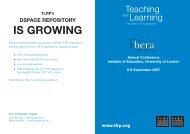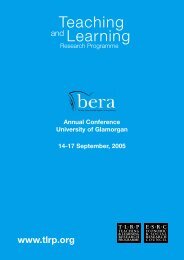Teachers - Teaching and Learning Research Programme
Teachers - Teaching and Learning Research Programme
Teachers - Teaching and Learning Research Programme
You also want an ePaper? Increase the reach of your titles
YUMPU automatically turns print PDFs into web optimized ePapers that Google loves.
17<br />
Table 2 Key principles governing theory based change<br />
Key Principles<br />
Theory is ‘context<br />
sensitive’<br />
Authentic<br />
context<br />
teaching<br />
Resource implications<br />
considered<br />
<strong>Teachers</strong> inducted into<br />
first principles<br />
Developed<br />
communities<br />
practice<br />
of<br />
Clearly delineated<br />
roles for LEAs <strong>and</strong><br />
headteachers<br />
Grouping (Blatchford,<br />
Galton & Kutnick)<br />
<strong>Teachers</strong> will develop<br />
programmes to train<br />
pupils to work in groups<br />
A range of KS1,KS2<br />
<strong>and</strong> KS3 classrooms<br />
will be used<br />
Cover provided but no<br />
additional classroom<br />
support<br />
Teacher packs will be<br />
produced<br />
<strong>Teachers</strong> who develop<br />
training programmes in<br />
cohort 1 will work with<br />
cohort 2.<br />
Emphasis on individual<br />
teachers<br />
<strong>Learning</strong> to learn<br />
(James, Wiliam &<br />
Southworth)<br />
An action research<br />
approach will be<br />
employed<br />
Opportunity samples<br />
based upon previous<br />
working relationships<br />
Key teachers <strong>and</strong><br />
advisers will offer<br />
support at each site<br />
Web resource of<br />
materials on learning to<br />
learn<br />
In one site whole school<br />
communities will<br />
participate<br />
Roles already<br />
established within<br />
existing structures<br />
Parents <strong>and</strong> <strong>Teachers</strong>’<br />
‘funds of knowledge’<br />
(Hughes & Pollard)<br />
An action research<br />
approach will be used.<br />
Schools situated within<br />
two contrasting regional<br />
cultures.<br />
Seconded teacher<br />
researchers will support<br />
the work<br />
Focus is on existing<br />
knowledge exchange<br />
among parents <strong>and</strong><br />
teachers<br />
Schools will need to<br />
endorse participation<br />
within<br />
their<br />
development plans<br />
Partnerships with LEAs<br />
already established<br />
In contrast, the two other projects have adopted an action research approach. Relevant<br />
research will be made available, in one case by means of a web site. However the<br />
emphasis placed on this material in providing a focus for the teachers’ deliberations does<br />
not appear as marked as in the grouping project. On the other h<strong>and</strong>, both projects, by their<br />
nature, offer additional support in the classroom, in Hughes <strong>and</strong> Pollard’s case by using<br />
seconded teachers as researchers. Out of the three examples considered, only the James’<br />
project on the Cambridge site proposes to use a whole school approach.<br />
The conclusion would seem to be that while elements of the framework proposed by<br />
Mclaughlin et al. are to be found in all three examples they are not so clearly delineated<br />
as in the three cases she describes in her paper. Part of the explanation may be that in the<br />
English (<strong>and</strong> Welsh) systems power is not so clearly concentrated within school districts<br />
but in different contexts resides either at national or school level. Local circumstances,<br />
therefore, largely dictate the form that partnerships with the LEA <strong>and</strong> its schools will<br />
take.

















